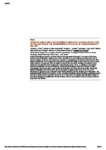Use este identificador para citar ou linkar para este item:
http://www.alice.cnptia.embrapa.br/alice/handle/doc/1036440| Título: | Potential reduction of environmental impacts of ethanol production by the adoption of the "environmental protocol of the sugar-energy sector". |
| Autoria: | PICOLI, J. F.  BARRANTES, L. D. S.   GOMES, R. T.   COSTA, K. R. da   MATSUURA, M. I. da S. F.   RAMOS, N. P.   FRIHAUF, C. von   |
| Afiliação: | JULIANA F. PICOLI, Unicamp; Letícia De Santi Barrantes, Universidade Tecnológica Federal do Paraná; RICARDO T. GOMES, Unicamp; Keyman R. da COSTA, Unicamp; MARILIA IEDA DA S F MATSUURA, CNPMA; NILZA PATRICIA RAMOS, CNPMA; Cláudia von FRIHAUF, USP. |
| Ano de publicação: | 2015 |
| Referência: | In: INTERNATIONAL CONFERENCE ON LIFE CYCLE MANAGEMENT, 7., 2015, Bordeaux. Mainstreaming life cycle management for sustainable value creation: abstracts... Bordeaux: Institut des Sciences Moleculares; The Life Cycle Group, 2015. |
| Páginas: | 96 |
| Conteúdo: | Brazil is the largest producer of ethanol derived from sugarcane in the world. The state of São Paulo, located in the southeastern region of the country accounts for 51% of national production and 16% of world production of ethanol. São Paulo was a pioneer in establishing an Environmental Protocol in 2006, which prohibited the burn of sugarcane straw before manual harvesting. In the season 2013/2014, seven million hectares of sugarcane were no longer harvested with use of fire, avoiding the emission of 26.7 million tons of pollutants and 4.4 million tons of greenhouse gases (GHG). In addition to reducing the emission of pollutants, it is expected that the mechanical harvesting promote the reduction of water consumption and the increase in cogeneration of electricity by the straw burn in the boilers at the mills. With the elimination of fire in the field, other conservation practices began to be used, such as the introduction of legumes crops during the reform of the plantation and the adoption of notill systems. The potential benefits of this set of practices are the reduction of synthetic nitrogen fertilizers application and the increase in carbon stocks and water reserve in soil. In this work, we evaluated the potential reduction of environmental impacts resulting from the introduction of these new practices in the production system of sugarcane and ethanol. |
| Thesagro: | Cana de açúcar Alcool |
| NAL Thesaurus: | Environmental assessment Sugarcane Ethanol Life cycle assessment |
| Tipo do material: | Resumo em anais e proceedings |
| Acesso: | openAccess |
| Aparece nas coleções: | Resumo em anais de congresso (CNPMA)  |
Arquivos associados a este item:
| Arquivo | Descrição | Tamanho | Formato | |
|---|---|---|---|---|
| 2015RA043.pdf | 129,9 kB | Adobe PDF |  Visualizar/Abrir |








